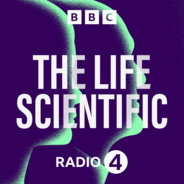Sir Peter Ratcliffe, Director of Clinical Research at the Francis Crick Institute, as well as Director of Oxford University’s Target Discovery Institute – has dedicated his life to understanding the body’s molecular-level response to low oxygen levels, or ‘hypoxia’. He received the 2019 Nobel prize for Physiology or Medicine, along with two Americans, William Kaelin of Harvard and Gregg Semenza of Johns Hopkins, for successfully tackling one of physiology’s greatest puzzles - how our bodies sense and adapt so quickly to a lack of oxygen, at high altitude for example, or during sudden exercise. He talks to Jim about how his early medical career led him into a deeply unfashionable area of medicine that would solve how and why our bodies are so clever at being able to fine tune themselves to keep functioning under a range of conditions. His early ground breaking discoveries may have been initially turned down by a major scientific journal, but he would go on to pave the way for promising new strategies to fight anaemia and many other challenging diseases, most notably cancer.Producer Adrian Washbourne

Wissenschaft & Technik
The Life Scientific Folgen
Professor Jim Al-Khalili talks to leading scientists about their life and work, finding out what inspires and motivates them and asking what their discoveries might do for us in the future
Folgen von The Life Scientific
348 Folgen
-
Folge vom 04.02.20202019 Nobel Prize winner for Physiology or Medicine, Sir Peter Ratcliffe
-
Folge vom 28.01.2020Peter Fonagy on a revolution in mental health carePeter Fonagy arrived in the UK from Hungary aged 15, not speaking a word of English. His family was in Paris. He was bullied at school, failed every exam and thought of ending his life. Therapy saved him, he says. Years later, he trained to be a clinical psychologist and then a psychoanalyst. His research on attachment styles between a mother and her baby (which can be healthy, anxious or avoidant) was ground breaking. He went on to show that the human need to be understood runs very deep indeed. The ability to ‘mentalise’ (to say that we’re feeling angry rather than being angry, for example) enables us to understand our own thoughts and feelings. And, Peter believes, it forms the cornerstone of good mental health. He pioneered a new way of treating people with borderline personality disorder which he called mentalisation based treatment, or MBT. Shocked to discover that such a simple approach was so effective, he set up randomised control trials to prove the effectiveness of this new approach to mental health care. The results were a revelation and it led to a revolution in mental health care for patients with a wide range of mental health problems, from borderline personality disorder to drug dependency, eating disorders and psychosis. Producer: Anna Buckley
-
Folge vom 14.01.2020Susannah Maidment on stegosaursSusie was dinosaur-mad as a child. But unlike most children, she never grew out of her obsession. She tells Jim about an exciting new stegosaur find in the Atlas Mountains in Morocco and describes the time she spent dinosaur hunting (with a toddler in tow) in the Morrison Formation in the American Mid-West: a place where there are thought to be enough dinosaur remains to keep a thousand paleontologists happy for a thousand years. She is at her happiest out in the field, with a hammer and a notebook, studying rocks and looking for dinosaur remains. We tend to lump dinosaurs together as though they all roamed the earth at the same time which is silly - given that they had the run of the place for nearly two hundred million years. Susie wants to sort out exactly which dinosaurs lived when. Although she warns, the fossil record is woefully incomplete. We will probably only ever know about 1% of what there is to know about all the dinosaurs that ever lived. Producer: Anna Buckley
-
Folge vom 07.01.2020Patricia Wiltshire on how pollen can solve crimes.Patricia Wiltshire grew up in a mining village in South Wales, left home when she was 17 and worked for many years, first as a medical technician and then as a business secretary (a profession her first husband considered to be more ladylike). When she was studying botany A level at evening classes, her teacher encouraged her to apply for university as a mature student. (She would never have considered it otherwise). And so began her career as a palynologist (studying pollen). She worked for many years reconstructing ancient environments on archaeological sites. But a phone call from a police detective led to a dramatic change of direction, when she was in her fifties. Since then, Pat has been involved in some of the most high-profile murder cases in Britain, including the murder of two ten year old girls in Soham in Cambridgeshire in 2002. She tells Jim Al-Khalili how she pioneered the use of pollen as evidence in criminal cases. Studying spores taken from suspects and victims, she can establish who’s been where and when. Her life, she says, has been 'a mess' but, on many occasions, the pollen she has gathered and analysed has helped to see that justice has been done. Producer: Anna Buckley
